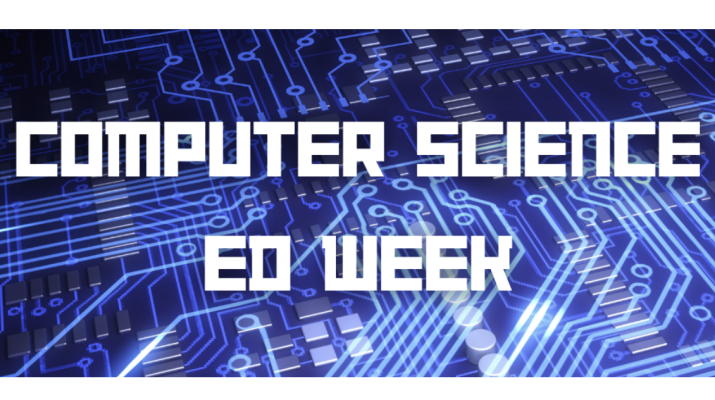Let’s talk about Computer Science! December 4-10, 2023 is international Computer Science Education Week. This week serves as a call to action for K-12 students to learn about computer science– skills that are foundational to 21st century learning. During this week, many schools and teachers will commit to Hour of Code, giving students hands-on experiences with coding.
“The Hour of Code is designed to demystify code and show that computer science is not rocket science—anybody can learn the basics. Over 100 million students worldwide have tried an Hour of Code.”
—Hadi Partovi CEO and founder of Code.org.
Many teachers may feel intimidated by the topic or don’t know where to start. In this blog post, you will find a number of compelling reasons to include computer science (CS) in your curriculum and numerous resources for how to get started. Even if you cannot do an Hour of Code during the week, hopefully you will come back to this at a later date when you’re searching for something to engage your students.
The Why… Virginia averaged 29,898 open computing jobs each month of 2023, according to the State of Computer Science Education Report. The average salary of these open jobs was over $120,000 and CS jobs are growing at double the rate of other jobs. If our graduates have not been introduced to CS concepts, they are not prepared for today’s workforce. Computer Science touches every aspect of our 21st century lives: Medicine, Politics, Business, Arts. We are teaching students who will have careers that do not exist yet. No matter what our students grow up to do, they benefit from computer science basics.
It’s about Equity…Computer Science standards need to be taught in every classroom. When CS is left to specialists, clubs, extracurriculars, and gifted and talented, then students are left out of this foundational learning. Integrating CS in the classroom ensures ALL students get a chance to learn computer science– a belief that both VDOE and CS organizations hold. It’s why Code.org launched its first Hour of Code in 2013– the belief that every student deserves to develop their computational thinking skills.
Did you know… that Virginia adopted computer science SOLs in 2017 that are meant to be integrated into instruction Kindergarten through 8th grade? The standards are organized into strands: Computing Systems, Networks and Internet, Cybersecurity, Data and Analysis, Algorithms and Programing, and Impacts of Computing. While many concepts from computer science overlap with other domains, it is important to explicitly teach computer science curriculum. By incorporating CS in the curriculum, all students get the chance to become college and career ready.
How to Participate… Hour of Code 2023 is dedicated to “Creativity with AI” and how it is already changing our world. Their website has already compiled many activities featuring AI as well as videos and resources helping students and educators understand more about Artificial Intelligence. Most of the planning has been done already, just look for the teacher guides for implementation. If you don’t want to start with AI, here are some other sites you can use to get started:
- CS Heroes Lessons
- Code.org Educator page
- Amazon Future Engineer: Virtual Tours
- Disney Hour of Code
- Hour of Code with Khan Academy
- CS First by Google
- “Unplugged” CS Fundamentals
Professional Development for Teachers
Remember, you don’t have to have all the answers to get started integrating CS in your curriculum. However, if you are interested in free professional development, check out Code Virginia. Their offices are right in downtown Richmond and they serve all VA schools. Their mission is to “partner with schools, parents, and communities to bring computer science education opportunities to all of Virginia’s students.” Not only do they provide free workshops for kids, they also provide FREE in-person and asynchronous professional learning for any Virginia educator and resources for schools. Check out their current offerings at: Professional Learning | CodeVA
Authorship Information:
Franny Aida serves as an Educational Technology Integrator in Richmond Public Schools. She is passionate about incorporating technology when teaching students to be future-ready citizens of Virginia. She is especially interested in how computer science will save the world.

